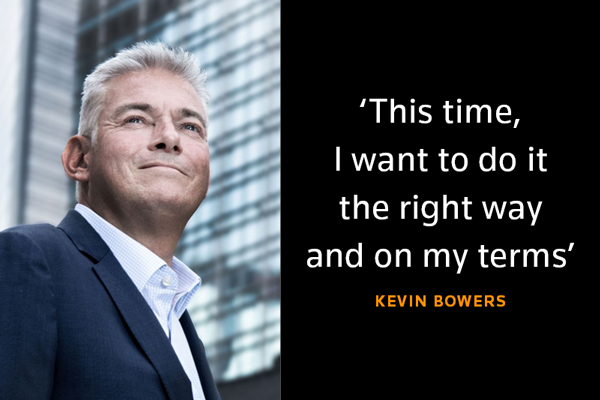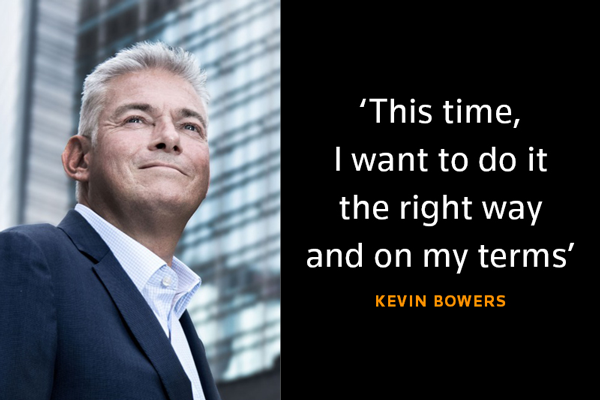
Hong Kong legal industry veteran Kevin Bowers has recently established a new firm called bowers.law. The firm, which takes a non-traditional approach to billing, may be something of a game-changer for the legal market, where firms typically remain coy about the billing process. Here, Bowers tells ALB why he thinks it’s time for a shakeup.
ALB: Can you tell us a bit about your career so far?
BOWERS: I began my career in 1990 with Masons in London, before being seconded to the firm’s Hong Kong office to help on a big fraud case in 1995, which is when I fell in love with the city. I relo-cated permanently to join Deacons as an associate in 1997 (my Hong Kong admission ceremony was the very last one before the Handover), and was appointed a partner in 2004. I joined Richards Butler’s Hong Kong office as a partner in 2011, not long after its merger with Reed Smith, I left to set up Howse Williams Bowers at the beginning of 2012, where I was a founding partner, until the end of 2018, shortly after the start of a criminal prosecution against me, which ended in September 2019 when I was cleared of all charges — I’m still trying to get costs back from the government.
ALB: What led to the establishment of bowers.law?
BOWERS: After being acquitted from my criminal prosecution in late 2019, I discovered that having already been a founding partner of one Hong Kong law firm, I had an irresistible urge to do it all over again. This time, I want to learn from experience and do it the right way and on my terms within a collegiate, inclusive and thoughtful working environment, and by applying a new business model. I wanted to find a way to eliminate the traditional law firm approach to billing clients based on anachronistic hourly rates — a billing system which I firmly believe is now out of touch with and unsuited to the modern business environment in which we all now live and work. It was definitely time for a change.
ALB: Can you tell us more about this different approach to billing?
BOWERS: Although many law firms with corporate/commercial departments charge based on fixed and staged fees, I don’t know of another Hong Kong law firm that charges clients only fixed, staged or retainer fees for providing dispute resolution legal services. There are no timesheets — that’s new and as I’m finding out very quickly, quite popular with the firm’s lawyers and new job applicants. I want to have a lower cost base for the new business by utilising and deploying legally qualified consultants in a wide variety of practice areas who are very good at what they do, but who do not necessarily want to live the full-on life of a full-time lawyer in private practice. The new firm offers a much more flexible model to its lawyers without compromising in any way in terms of the quality of legal services that the firm provides to its clients. The new firm also incorporates a separately branded crisis management agency called Alinea, which teams-up with its public relations, media and communications partners, as well as forensic accounting/investigation service providers to offer a “one-stop-shop” to the firm’s corporate and individual clients who find themselves in challenging situations. The firm values its lawyers only by the quality of legal work that they produce, not by how many chargeable hours they record on their timesheets.
ALB: In your opinion, is this type of billing arrangement likely to become more common?
BOWERS: Definitely! Providing value and certainty to corporate and individual clients is what they want. From my experience, the practice of sending clients mystery monthly bills belongs to the times of Charles Dickens, and has to be finally drawing to an end. Pricing legal services only by how long it takes a group of lawyers to do a piece of work, and ignoring the value of that work to the client does not provide the client with either value or certainty, and is completely outdated and is unsuited to the modern world in which we all now live and work. My firm agrees on the fee for the work to be done by its lawyers based upon the value of that work to the clients which is bespoke to its clients’ needs, and which encourages the legal services to be provided as quickly, efficiently and as cost-effectively as possible (and which eliminates the inevitable and very considerable internal pressure on all private practice lawyers to record as much time as they possibly can on their timesheets).
To contact the editorial team, please email ALBEditor@thomsonreuters.com.



